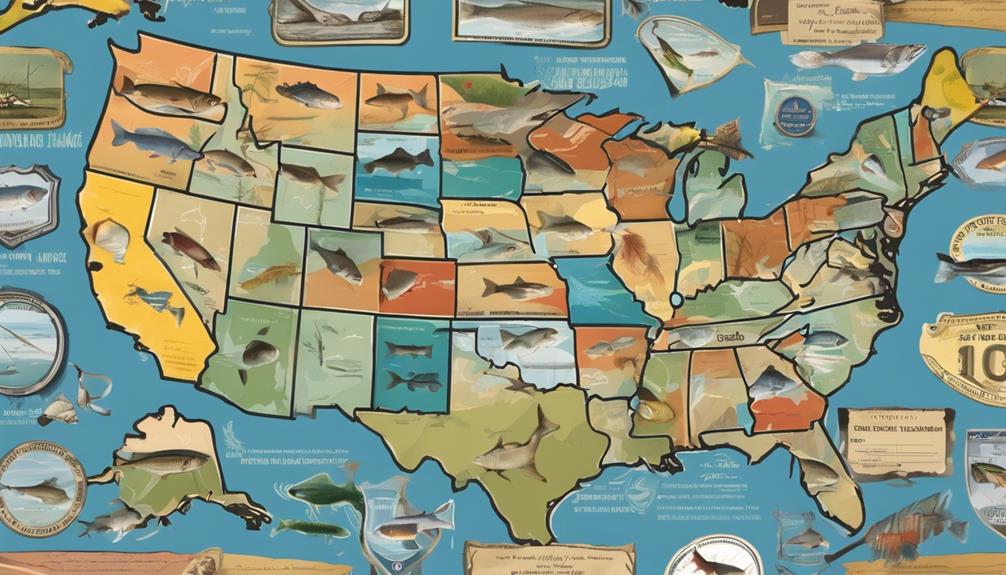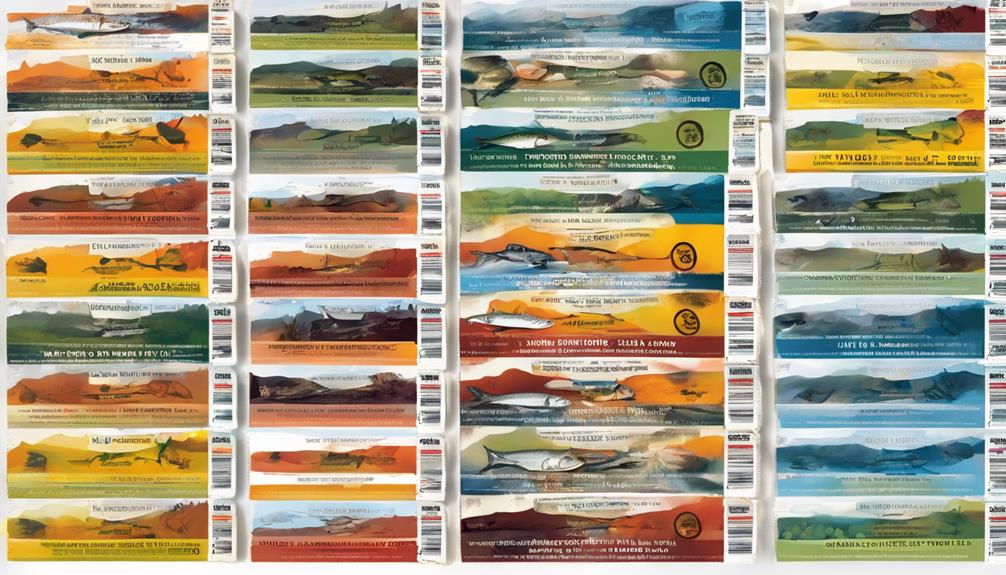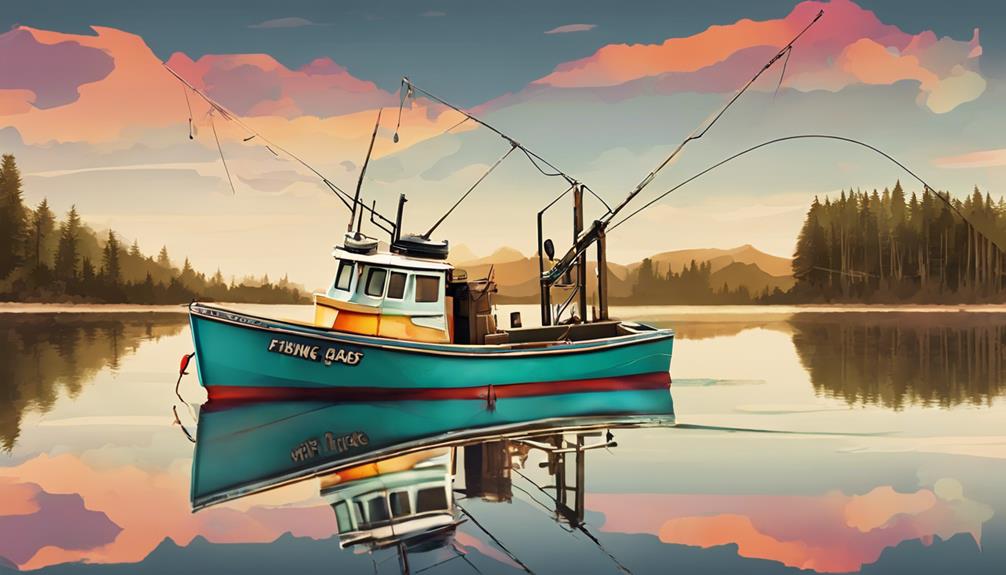Did you know that each state has its own regulations regarding the validity period of fishing licenses? Some states offer annual licenses, while others have shorter durations or unique options.
As you explore the top 10 list comparing state fishing license validity, you'll uncover surprising variations that may impact your fishing plans. Understanding these differences can help you make informed choices and ensure you have the right permits for your angling adventures.
License Validity Periods
When comparing state fishing licenses, consider the varying validity periods for each. Some states offer annual licenses that require renewal every year, while others provide licenses that are valid for longer periods, such as three or five years. It's essential to check the expiration date of your fishing license to avoid fishing illegally and facing potential fines.
If you opt for an annual license, make sure to mark your calendar with the renewal date to ensure uninterrupted fishing privileges. Many states offer convenient online renewal options to make the process quick and easy. Additionally, some states may allow for automatic renewal, saving you time and effort each year.
For those looking for extended validity, states offering licenses valid for multiple years can be a great option. Not only does this save you the hassle of renewing annually, but it also often comes at a discounted rate compared to purchasing yearly licenses consecutively. In case you find yourself wanting to extend the validity of your current license, check with your state's fishing regulations for any validity extension options available.
Understanding the license validity periods of different states can help you choose the most convenient option based on your fishing habits and preferences. Whether you prefer the simplicity of an annual renewal or the long-term benefits of a multi-year license, there are choices to suit every angler's needs.
Reciprocal Agreements
Explore the benefits of reciprocal agreements between states for fishing license holders. When states enter into reciprocal agreements, it benefits anglers who wish to fish across state boundaries without the hassle of obtaining multiple licenses. Here's how these agreements work:
- Simplified Process: Reciprocal agreements streamline the licensing process for anglers by allowing them to use their home state license to fish in another state. This eliminates the need to navigate through different sets of regulations and purchase additional licenses when crossing state lines.
- Consistent Fishing Regulations: Through these agreements, states agree to honor each other's fishing regulations. This consistency ensures that anglers understand and abide by the rules regardless of where they're fishing. It creates a more seamless experience, reducing confusion and promoting compliance with local fishing laws.
- Cost Savings: By recognizing each other's fishing licenses, states help anglers save money on purchasing multiple licenses for different jurisdictions. This cost-effective approach encourages more anglers to explore and enjoy fishing opportunities in neighboring states without financial barriers hindering their experience.
Reciprocal agreements enhance the fishing experience for license holders by simplifying the process, ensuring consistent regulations, and promoting cost savings. These agreements facilitate a smoother fishing journey across state boundaries, allowing anglers to focus on what they love most – catching fish.
Non-Resident Restrictions
To ensure you understand the regulations that may affect your fishing experience in different states, it's important to be aware of any non-resident restrictions that could apply to you. Non-resident restrictions vary from state to state and can impact both the fees you pay and the fishing locations you can access.
When it comes to non-resident fees, some states charge higher rates for those who don't reside within their borders. These fees can sometimes be significantly more expensive than what residents pay, so it's essential to check the specific regulations of the state you plan to fish in. Being aware of these fees beforehand can help you budget appropriately for your fishing trip.
Additionally, non-resident restrictions can also affect the fishing locations available to you. Some states have designated certain areas or bodies of water for residents only, while others may have restrictions on the types of fish that non-residents are allowed to catch. Understanding these limitations can prevent any surprises or disappointments during your fishing excursion.
Before heading out to fish in a new state, make sure to research the non-resident fees and any restrictions on fishing locations that may apply to you. By being informed and prepared, you can enjoy a smooth and hassle-free fishing experience in any state you choose to visit.
Digital License Options
Consider utilizing digital fishing license options for convenient and efficient access to your fishing permits. With online accessibility and mobile convenience, managing your fishing licenses has never been easier.
Here are three key benefits of opting for digital fishing permits:
- Instant Access: Say goodbye to waiting in long lines or dealing with paper forms. Digital fishing licenses can be purchased online with just a few clicks. Once bought, you can immediately access and display your permit on your smartphone or other devices.
- Convenience on the Go: Whether you're planning a spontaneous fishing trip or you realize your license has expired while at the water's edge, digital licenses have you covered. Simply log in to the licensing website, renew or purchase your permit, and you're ready to cast your line.
- Eco-Friendly Option: Going digital not only benefits you but also the environment. By reducing the need for printing paper permits, digital licenses help in conserving resources and cutting down on waste. Embrace the digital age while being mindful of the planet.
Embrace the ease and simplicity of digital fishing licenses for a hassle-free fishing experience. Enjoy the water knowing your permits are just a few taps away!
Age-Specific Regulations
Navigating age-specific fishing regulations ensures compliance with state laws and promotes responsible fishing practices. Understanding the age requirements set by each state is crucial to avoid any legal issues while enjoying your fishing trips. Some states offer youth exemptions, allowing young anglers to fish without a license up to a certain age. These exemptions are designed to encourage youths to engage in the sport and foster an interest in fishing from a young age. It's essential to check the specific age threshold for youth exemptions in the state where you plan to fish.
On the other hand, many states provide senior discounts for older anglers. Senior discounts are a way to acknowledge the lifelong dedication of seasoned anglers and make fishing more accessible to them. If you qualify for a senior discount, make sure to take advantage of this benefit when purchasing your fishing license. By adhering to age-specific regulations and taking advantage of youth exemptions or senior discounts where applicable, you can ensure that you're fishing legally and responsibly.
Before heading out to your next fishing adventure, take a moment to review the age-specific regulations in the state you'll be fishing in. Being informed about youth exemptions, senior discounts, and other age-related rules will help you enjoy your time on the water without any worries about breaking the law.
Seasonal Restrictions
Ensure you're aware of any seasonal restrictions in place before embarking on your next fishing excursion in your chosen state. Seasonal restrictions are essential for maintaining healthy fish populations and ecosystems. Here are some key points to consider:
- Catch Limits: Many states enforce catch limits during specific seasons to prevent overfishing and ensure sustainable fish populations. These limits may vary depending on the species and location, so make sure to check the regulations for the area you plan to fish in. By adhering to catch limits, you contribute to the conservation of fish populations for future generations to enjoy.
- Conservation Efforts: Seasonal restrictions also play a crucial role in conservation efforts. Certain times of the year are critical for fish breeding and migration, and restrictions help protect these vulnerable periods. By respecting seasonal closures and restrictions, you support the overall health of aquatic ecosystems and contribute to the preservation of fish habitats.
- Regulatory Compliance: Understanding and following seasonal restrictions demonstrate your commitment to responsible fishing practices. It's essential to stay informed about any changes in regulations to avoid penalties and contribute to the sustainability of fish populations. By being aware of seasonal restrictions, you actively participate in conservation efforts and help maintain the balance of marine environments.
Special Permits Required

Before heading out on your next fishing excursion, make sure to familiarize yourself with any special permits required for the specific location you plan to fish in. Special permits are additional permissions that may be needed beyond a standard fishing license, especially when fishing in conservation zones or participating in certain types of fishing activities.
Conservation zones are designated areas where special regulations are in place to protect the environment and wildlife. These zones are crucial for maintaining healthy fish populations and preserving the natural habitat. To fish in these areas, you may need a special permit that allows you to comply with the specific rules and restrictions set for conservation purposes.
When planning your fishing trip, check with the local authorities or visit their official website to find out if you need any special permits for the location you intend to fish in. Some states require permits for fishing in certain bodies of water, while others may have restrictions on the type of fish you can catch or the gear you can use.
License Cost Comparison
When considering the costs associated with fishing permits and special permits, it's essential to compare the license fees across different states to understand the financial implications of your fishing trips.
Here are some key points to consider for a cost-effective fishing license purchase:
- Cost Variations:
- License fees can vary significantly from state to state, so it's crucial to research and compare prices before making a purchase.
- Some states offer annual licenses, while others provide options for shorter durations like daily or weekly permits, each with different costs.
- In addition to the base license fee, some states may require additional fees for special permits or stamps for specific types of fishing, such as trout or salmon fishing.
When looking to maximize your cost effectiveness, it's beneficial to explore discount options that states may offer:
- Discounted Rates:
- Many states provide discounted fishing license rates for seniors, veterans, youth, or individuals with disabilities.
- Some states offer multi-year licenses at a discounted rate compared to purchasing an annual license each year.
- Consider purchasing a combination license if you plan to engage in both fishing and hunting activities, as it may offer savings compared to buying separate licenses.
Frequently Asked Questions
Are There Any Discounts or Promotions Available for Purchasing Fishing Licenses in Bulk?
Yes, there are discounts and promotions available for purchasing fishing licenses in bulk. Some states offer reduced rates for buying multiple licenses at once.
Keep in mind that not all states allow sharing or transferability of licenses. Before making a bulk purchase, check the specific regulations of the state you're interested in to ensure you understand any limitations or requirements regarding license distribution.
Can Fishing Licenses Be Transferred or Shared Among Family Members or Friends?
Yes, fishing licenses typically can't be shared among family members or friends as they're generally non-transferable. Each person who wants to fish will need to obtain their own individual license.
It's important to check the specific rules and regulations of the state where you plan to fish to ensure compliance. Remember, fishing licenses are usually meant for individual use and can't be transferred between people.
Are There Any Restrictions on the Type of Fishing Equipment That Can Be Used With a Fishing License?
When using your fishing license, it's important to follow fishing equipment regulations. Some states may have restrictions on the type of gear you can use while fishing. Make sure to check the specific rules in your area to ensure you're in compliance.
Additionally, keep in mind any license sharing restrictions that may apply. It's always best to be informed and abide by the regulations to enjoy a hassle-free fishing experience.
Are There Any Specific Rules or Regulations Regarding Catch Limits for Certain Species of Fish?
When it comes to catch limits, various states have rules in place to protect fish populations. Bag limits and catch size restrictions are set to promote conservation.
These regulations help in monitoring the number of fish being caught, ensuring sustainable fishing practices.
It's important to be aware of these rules and follow them to help preserve the marine ecosystem for future generations.
Can Fishing Licenses Be Used in Multiple Locations Within the Same State, or Are They Only Valid for Specific Bodies of Water?
Fishing licenses in most states are typically valid for multiple locations within the same state. This license portability allows you to fish in various bodies of water without needing a separate permit for each one.
However, it's important to be aware of state regulations regarding specific areas and species. Some states may offer license reciprocity, allowing you to use your in-state license in certain out-of-state locations.
Always check the local rules before casting your line!
Conclusion
Overall, when comparing state fishing license validity, it's important to consider factors such as reciprocity agreements, non-resident restrictions, and digital options. Each state has its own regulations and requirements, so it's crucial to research before heading out on your next fishing adventure.
Remember to check for any special permits needed and be aware of any age-specific or seasonal restrictions. And of course, don't forget to factor in the cost when making your decision on where to fish.
Happy fishing!



